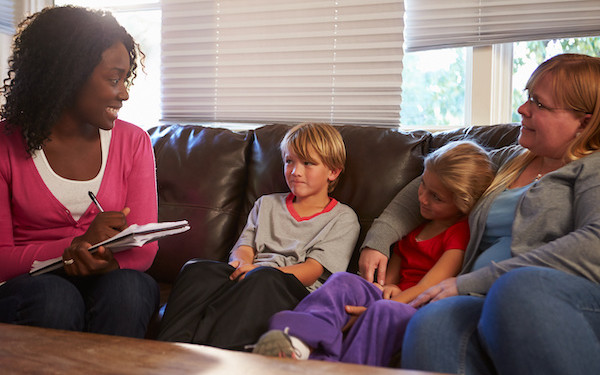
by Simon Haworth
Since the early part of this century, there has been a constant withering of support for families and redefinition of what help remains into investigations of families and increasing removal of children into care and adoption.
A new report, Children’s Social Care – The Way Forward, from the Parent Families and Advocacy Network (PFAN) and five other family-focused organisations, sets out ideas on making the system more supportive, humane and inclusive, and ensuring families’ needs are met early, with advocacy a core feature.
It also argues for immediate changes, led by parents and children with lived experience of social care. The report is based on the experiences of some of these parents, with input from allies who work in children’s social care or are social work academics.
The report suggests in its introductory summary:
“To transform the system, we will need to nurture and test out a range of strategies which shift the power from government and public services to parents, children and communities. Alongside this immediate changes are required to children’s social care led by parents and children with lived experience of children’s social care.”
What needs to change
Briefly, the main issues our report identifies are:
- Social work with children and families has become engulfed in child protection processes and care proceedings, with associated heavy bureaucratic demands. It focuses almost entirely on risk, at the cost of meeting needs. This is embedded in Working Together to Safeguard Children. Blame permeates the system for families, but also for social workers, when things go wrong.
- For a variety of reasons, there is constant change and a lack of stability in the system. As a result, families do not experience continuity of services. Further, there is a focus on assessments and meetings, but not enough on offering and providing support.
- Legal representation for parents and children does not function effectively in many family court cases. Further, the lack of investment in therapeutic services for parents involved in care proceedings can effectively set them up to fail.
- Current responses can leave mothers who have experienced domestic abuse doubly oppressed, by being subject to domestic violence while being threatened with having their children removed. There is a need to better understand and accept how the state and its agencies can reinforce oppression.
- Many families with a disabled child are forced through safeguarding assessments when there is no indication of neglect or abuse, and don’t receive the help they need.
- The prioritisation of adoption means too many children lose all family ties.
- The system lacks champions to develop new ways of inclusive partnership working with families.
Away from a culture of blame
We argue for a cultural shift from parental blame to genuinely fostering partnership and the participation of families and communities. Our organisations need to move from a culture of risk, suspicion and blame to helping families and communities to find their own solutions.
We know social work is at its best when it adopts a relationship-based, proportionate and humane approach, and gets to know and work with children and their families. For this to happen, practitioners need to be given the time to work directly with families and communities within a culture that focuses on root causes and does not individualise problems.
Parental advocacy, delivered by parents with lived experience, has been shown to be a powerful way to change our working cultures, build bridges and improve the focus and scope of support for children and their families. A range of mainly US studies show, for example, that advocacy improves outcomes in child protection conferences, alongside legal representatives in care proceedings, as part of substance use programmes, and in child welfare agencies. Parents are employed or volunteer directly in social work agencies, in legal practices, or in independent agencies and funding depends on the nature of involvement and the model used.
Related reading
‘As poverty has become more about individuals, child protection has become more authoritarian’
We need genuinely family-focused guidance to replace Working Together, which places a singular focus on risk of harm, whether discussing early help, children in need or child protection investigations. Many parents tell us their experience of asking for help is demeaning, and one of being treated with suspicion.
Children in need and early help guidance should instead focus on the parents’ and child’s concerns and the co-production of plans and their implementation. Even where there is a child protection investigation, families should be treated with dignity, and assessment and planning for the child and family’s needs should be included.
Making the legal process fairer
We provide examples of positive and supportive work with children, families and communities that can be built on, such as Leeds council’s focus on providing timely and focused support and Camden’s creative use of family group conferences and developing parent advocacy.
We argue for the development of a social model for domestic abuse, where practice pays careful attention to the individual stories of pain and trauma within the wider contexts of societal inequality and disadvantage. Under such a model, support and help would be offered in partnership with new ways of working – such as motivational interviewing – being used to genuinely share control, empower and work together.
Many parents also see defence lawyers having ‘cosy’ relationships with the local authority and not challenging their positions strongly. We need to develop a panel of lawyers who demonstrate their independence by not taking on cases on behalf of the local authority, not forming close relationships with local authority representatives and actively challenging the local authority’s case.
Again looking to the US, in many places law firms employ social workers and parent advocates, who are involved in case planning and ensure parents understand the process and that commitments are feasible for parents and children to undertake. Research shows this can reduce the numbers of children in care with no increase in risk of maltreatment to children and considerable savings to overall expenditure. Here, legal teams including both parent and child advocates could be funded as an alternative to the CAFCASS role and might better protect children’s rights.
Finally, adoption should be a genuinely last resort, and permanence should in the vast majority of cases be open. As our report proposes, “where permanent alternative care is needed, it should be legally possible to use special guardianship for children in care [which] would leave open a flexible approach to contact and the possibility of changing levels and approaches to parental and wider family involvement”.
We can build on these foundations to develop and deliver co-produced services that offer hope and compassion. Our report concludes that “in the present situation, change should emphasise the need for reconnecting communities and professional systems, partnership with parents and children and have a clear prioritisation of proactive and preventative practice”.
We would love you to join us on this journey.
Simon Haworth has written this piece on behalf of PFAN. He is a lecturer at the University of Birmingham. He is also a core member of (PFAN) and founding member of the Best Interests of the Child Review (BIC Review). He tweets @SiHaworth.
Children’s Social Care – The Way Forward was prepared by Professor Andy Bilson, with the input of key PFAN parents and allies, and based on consultations with parents and allies by PFAN, Love Barrow Families, New Beginnings, Parent and Carer Alliance, Southwark Family Council and Parent to Parent Peer Advocacy.



 Bournemouth, Christchurch and Poole
Bournemouth, Christchurch and Poole  Hampshire County Council
Hampshire County Council  Lincolnshire County Council
Lincolnshire County Council  Norfolk County Council
Norfolk County Council  Northamptonshire Children’s Trust
Northamptonshire Children’s Trust  South Gloucestershire Council
South Gloucestershire Council  Wiltshire Council
Wiltshire Council  Wokingham Borough Council
Wokingham Borough Council  Children and young people with SEND are ‘valued and prioritised’ in Wiltshire, find inspectors
Children and young people with SEND are ‘valued and prioritised’ in Wiltshire, find inspectors  How specialist refugee teams benefit young people and social workers
How specialist refugee teams benefit young people and social workers  Podcast: returning to social work after becoming a first-time parent
Podcast: returning to social work after becoming a first-time parent  Podcast: would you work for an inadequate-rated service?
Podcast: would you work for an inadequate-rated service?  Family help: one local authority’s experience of the model
Family help: one local authority’s experience of the model  Workforce Insights – showcasing a selection of the sector’s top recruiters
Workforce Insights – showcasing a selection of the sector’s top recruiters 

 Facebook
Facebook X
X LinkedIn
LinkedIn Instagram
Instagram
I’m in, Simon, thankyou so much for this piece. You have captured the central vision of ‘Assurance: Parents and Carers. Starting with the child or young person, stabilising the family/Fostering family around them and working out towards strengthened Communities and reunification. We would very much like to join you on this journey.
Debra Gibbs
I totally agree with Simon Haworth but will the government be on board this journey to transform child social care in this country? And what happens to all the families who have had children wrongfully removed from their care, lost children to adoption because adoption was never the last resort?
Having experienced a full section 47, when requesting SEND support; eventually an independent lawyer stopped it with one letter ; but only after the devastating process had caused family harm and destruction. I would be happy to share a wealth of hard evidence to this suggestion of reform. It is concerning that many parents do not get justice. My complaints were all fully acknowledged and fully ignored. There is now an urgent need to make this systemic failure both public and transparent .
I now volunteer for a CIC to try and prevent this devastation happening to more families , we are building a team of parent peer supports @DefineFineParentPeerSupport .
Thank you for your research
Hi Debra and Carol. Thank you for your thoughtful comments. We don’t believe change will be easy, but do believe it is possible, and the more who join the journey the more powerful our collective voice.
Do come and join us at PFAN, your views and voices would be most welcome, we are a friendly bunch!!:
https://www.pfan.uk/home/register/
I cannot see the current adopting the recommendations proposed given the responses to the recent high profile deaths reported in the media. In order for this model to work there needs to be investment in communities and for social workers to be based in schools, hospitals etc to reduce the stigma attached to social workers.
I am a retired lecturer of Child Development and have adopted 6 of my 7 children. I currently support several patents in understanding more about the CP procedures as their trauma gets in the way of their understanding or ability to type emails or know what to do next. Please let me know how I can help with this very inspiring research which can give a glimmer of hope to so many distraught parents in the UK. I can request several true stories from the parents I’m in communication with. Do you offer an emergency help line for those opposing a placement order as urgent help is currently needed for a dad I’m helping in NI. He has permission to appeal but we can’t now fail for lack of constructive information on why the judge was unfair or unreasonable in his conclusions. Thanks.